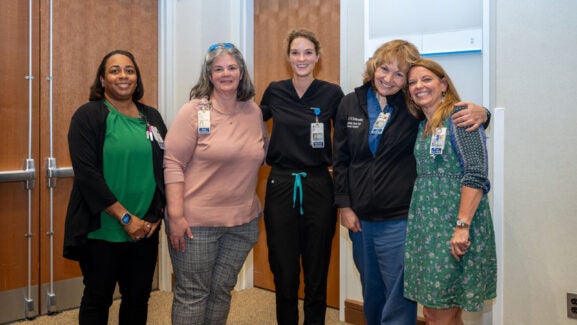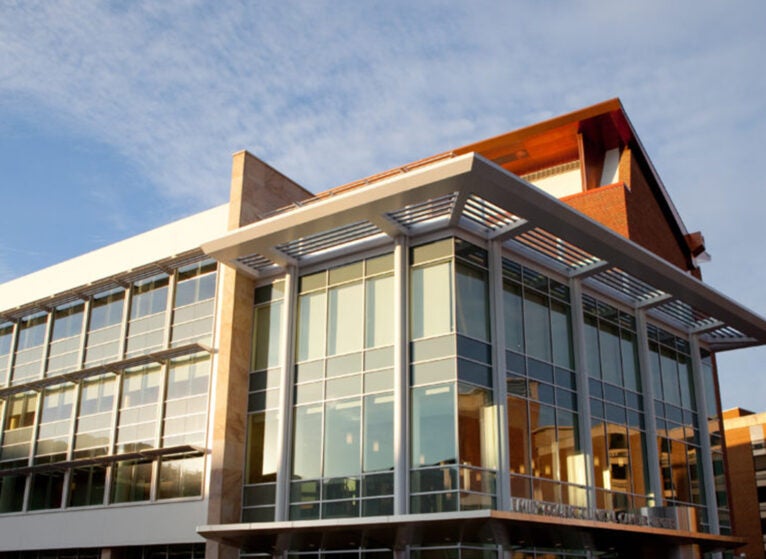

UVA Comprehensive Cancer Center Receives $13 Million to Battle Deadliest Blood Cancer
UVA Comprehensive Cancer Center researchers have received $13 million from the National Cancer Institute to advance innovative new approaches to treating acute myeloid leukemia (AML), the deadliest form of blood cancer.
The researchers are targeting molecules called sphingolipids found inside the cancer cells. These molecules, the scientists believe, are essential for the cancer’s growth and spread — and could be its Achilles’ heel.
UVA Comprehensive Cancer Center Director Thomas P. Loughran Jr., MD, and his collaborators will use the NCI funding to better understand and characterize sphingolipids. They ultimately hope to replace one type of sphingolipid, called ceramides, with a substitute that will kill the cancer.
“We’ve made great progress understanding how AML works and how patients respond to treatment differently,” Loughran says. “This project will build on that, drawing on disciplines ranging from hematology to the engineering of nanotechnology to deliver new therapies directly to cancer cells. We’re thrilled to continue this collaborative work to reduce the impact of this devastating disease.”
About Acute Myeloid Leukemia
AML is a relatively rare but particularly deadly blood cancer primarily seen in people over the age of 68. More than 22,000 Americans develop the condition each year, and more than 11,000 die, according to the American Cancer Society. Overall, the disease accounts for about one in three cases of blood cancer.
There are several existing treatments for AML, including chemotherapy, stem cell transplants and immunotherapy that aims to augment the immune system’s response to the disease. But the effectiveness of these treatments varies among patients, and not all patients — especially older ones — are able to tolerate chemotherapy, the first-line treatment. So new options are greatly needed.
Loughran, UVA’s Charles Chalfant, PhD, and David Feith, PhD, were awarded the $13 million based on UVA Comprehensive Cancer Center’s long track record of advancing our understanding of AML. Loughran and his collaborators, including Kevin Janes, PhD, and Bishal Paudel, PhD, previously found that they could measure sphingolipids in patients’ cells to determine whether the patients would be resistant to chemotherapy and should consider alternative treatments or a clinical trial.
“There is a strong clinical need to improve treatment outcomes for AML,” Chalfant says. “Through this award, our team will now be able to build the foundational research to rapidly bring new therapeutic avenues for this disease to the bedside.”
UVA’s Michael Keng, MD, will lead an upcoming multisite study evaluating the potential of nanotechnology to deliver select ceramides to AML cells.
The trial and ongoing sphingolipid research have been made by possible by NCI grants P01CA171983 and P01CA302570, the Commonwealth Fund for Cancer Research and Scarlet Feather Fund support of UVA’s Translational Orphan Blood Cancer Research Initiative.
About UVA’s Cancer Research
Finding new ways to improve cancer care is a core mission of both UVA Comprehensive Cancer Center and UVA’s Paul and Diane Manning Institute of Biotechnology. UVA Comprehensive Cancer Center is one of only 57 cancer centers in the country to earn the “comprehensive” designation from the National Institutes of Health’s National Cancer Institute in recognition of their exceptional patient care and cutting-edge cancer research.
The Manning Institute, meanwhile, has been launched to accelerate the development of new treatment and cures for the most challenging diseases. This will be complemented by a statewide clinical trials network that expands access to potential new treatments as they are developed and tested.
To keep up with the latest medical research news from UVA, subscribe to the Making of Medicine blog
Latest News



